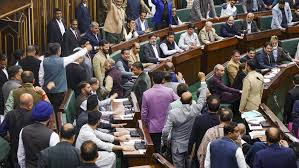J&K Land Controversy: Legislators Question Land Allotment to Sri Lankan Cricketer
Jammu and Kashmir has been thrust into the spotlight yet again, this time with a contentious debate over the allocation of land in the union territory. The heart of the controversy lies in the allotment of 10.4 hectares of prime land in Kathua district to a Sri Lankan cricketer for establishing an aluminum can manufacturing and beverage-filling unit, reportedly backed by a staggering ₹1,600 crore investment. This development has sparked outrage among legislators and citizens alike, with many questioning the transparency and fairness of such a decision.
Assembly in Uproar
The issue erupted during a heated session in the Jammu and Kashmir Assembly when CPI(M) MLA Mohammad Yousuf Tarigami brought attention to the matter. Seeking clarification, Tarigami pressed for details on the criteria used for the allotment and asked why a foreign entity was being prioritized over local residents. The legislator’s queries resonated with several members of the Assembly, who joined him in voicing their concerns.
Congress MLA Ghulam Ahmed Mir labeled the issue as a serious matter that warranted immediate discussion, while AAP legislator Mehraj Malik criticized the apparent neglect of local interests. “It is ironic that the very people who own the land in Jammu and Kashmir are being displaced, while outsiders are being given prime plots without any substantial explanation,” Malik remarked. His comments underscored a growing sentiment among the region’s citizens, who feel increasingly sidelined in the face of external investments.
Adding to the chorus of discontent, BJP MLAs Shakti Raj Parihar and Balwant Singh Mankotia highlighted the delays in compensating locals whose land had been acquired for government projects. Independent MLA Choudhary Akram also alleged that people in his constituency had been evicted from their rightful lands without due process.
Minister Feigns Ignorance
Caught off-guard by the intensity of the debate, J&K Rural Development and Panchayati Raj Minister Javid Ahmed Dar appeared to have no answers. When asked about the land allotment, Dar simply stated, “We will look into the issue,” a response that only further fueled the discontent within the Assembly. His apparent lack of awareness about such a high-profile deal raised eyebrows and amplified suspicions about the transparency of the process.
Broader Implications
This controversy shines a spotlight on the larger issue of land management and governance in Jammu and Kashmir. Legislators pointed out that while land was being allotted to a foreign investor, local families under government schemes like the Pradhan Mantri Awas Yojana (PMAY) often faced significant delays and roadblocks. According to official data, only 3,673 beneficiaries had received land under the PMAY-G scheme, with an additional 498 individuals still waiting for their allotments.
The apparent disparity in how land is allocated raises questions about the government’s priorities. “It’s not just about one cricketer or one deal; it’s about a pattern of neglect towards the people of Jammu and Kashmir,” stated Tarigami. His words captured the essence of the debate, which goes beyond just one allocation to touch upon broader concerns of equity and justice.
Public Reactions and Allegations
Outside the Assembly, the issue has sparked widespread discussions across Jammu and Kashmir. Social media platforms are abuzz with criticism, with many users accusing the government of favoring external investors at the expense of local citizens. Some have even alleged that the land allotment to the Sri Lankan cricketer is part of a larger agenda to dilute the region’s unique identity and economic autonomy.
“The question is not whether investment is welcome—it is. But at what cost? Why are locals being displaced or overlooked while outsiders are offered prime opportunities?” said a prominent activist from Kathua district, voicing a sentiment that seems to resonate with many.
What Lies Ahead
The government now faces the challenge of addressing these concerns in a transparent and convincing manner. While investments and industrialization are vital for economic growth, they must be balanced against the rights and aspirations of the local populace. For now, the controversy surrounding the Kathua land allotment serves as a reminder that governance is as much about perception as it is about policy.



